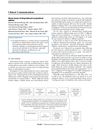 January 2024 in “Pakistan Journal of Medicine and Dentistry”
January 2024 in “Pakistan Journal of Medicine and Dentistry” An 18-year-old girl improved with treatment after being diagnosed with both Systemic Lupus Erythematosus and Celiac Disease.
 5 citations,
May 2019 in “Cureus”
5 citations,
May 2019 in “Cureus” Taking biotin supplements can cause incorrect thyroid test results, leading to wrong diagnoses.
[object Object]  1 citations,
July 2023 in “Cytotherapy”
1 citations,
July 2023 in “Cytotherapy” Magnetic nanovesicles from stem cells can improve hair growth by staying in the skin longer.
 4 citations,
April 2022 in “Dermatologic Therapy”
4 citations,
April 2022 in “Dermatologic Therapy” Injecting scalp tissue micrografts is a safe and effective treatment for hair loss after COVID-19.
 2 citations,
April 2022 in “Indian Journal of Dermatology, Venereology and Leprology”
2 citations,
April 2022 in “Indian Journal of Dermatology, Venereology and Leprology” Platelet-rich plasma is a promising and safe treatment for increasing hair density and thickness in women with chronic telogen effluvium.
7 citations,
January 2013 in “Pediatrics in review” The document says menstruation is important for women's health, discusses menstrual disorders, and suggests personalized treatment options.
 October 2023 in “Dermatology practical & conceptual”
October 2023 in “Dermatology practical & conceptual” Many patients experienced hair loss after COVID-19, with women affected more, starting on average 49 days post-infection.
 December 2023 in “Research Square (Research Square)”
December 2023 in “Research Square (Research Square)” People with Down syndrome have higher rates of certain immune-related conditions and need special medical attention.
 July 2018 in “Elsevier eBooks”
July 2018 in “Elsevier eBooks” Telogen Effluvium is a common, usually reversible hair loss condition, often improved by removing the trigger and possibly treated with various products, though their effectiveness is uncertain.
 3 citations,
January 2019 in “Elsevier eBooks”
3 citations,
January 2019 in “Elsevier eBooks” Pharmacists should interpret lab data and perform physical exams to improve patient care.
 8 citations,
January 2015 in “World Journal of Gastroenterology”
8 citations,
January 2015 in “World Journal of Gastroenterology” Hair loss is common in IBD patients, and some medications may lower the risk.
 4 citations,
July 2018 in “The Journal of Allergy and Clinical Immunology: In Practice”
4 citations,
July 2018 in “The Journal of Allergy and Clinical Immunology: In Practice” Four new substances—minoxidil, ferrimanitol ovalbumin, clarithromycin, and glucosamine-hydrochloride—can cause occupational asthma.

Combining stress management and Minoxidil helps treat stress-related hair loss and improve well-being.
 22 citations,
January 2015 in “BioMed Research International”
22 citations,
January 2015 in “BioMed Research International” More adolescent girls in urban areas of India have Polycystic Ovary Syndrome compared to those in rural areas.
26 citations,
July 2011 in “PubMed” Treating H. pylori infection might help cure alopecia areata.
 14 citations,
January 2015 in “ABCD”
14 citations,
January 2015 in “ABCD” The surgery effectively promoted and maintained weight loss in obese women during the first year.
 5 citations,
January 2020 in “Journal of Dermatology”
5 citations,
January 2020 in “Journal of Dermatology” Temporal hair loss relates to overall scalp hair loss in women.
 January 2024 in “International journal of homoeopathic sciences”
January 2024 in “International journal of homoeopathic sciences” Homeopathic treatments can effectively manage hair loss and improve well-being.
 5 citations,
January 2016 in “Journal of The American Academy of Dermatology”
5 citations,
January 2016 in “Journal of The American Academy of Dermatology” Skin doctors should know about skin and kidney disease links to prevent serious kidney problems.
[object Object] 
A man with four autoimmune diseases suggests a new category for multiple autoimmune syndrome.
 8 citations,
January 1996 in “Gynecological Endocrinology”
8 citations,
January 1996 in “Gynecological Endocrinology” Cyproterone acetate is the preferred treatment for women's hyperandrogenism when estrogen/progestogen use is safe.
 22 citations,
January 1995 in “The American Journal of Medicine”
22 citations,
January 1995 in “The American Journal of Medicine” Newer low-dose oral contraceptives with less androgenic effects improve patient compliance.
4 citations,
September 2023 in “Nutrients” Managing diabetes can lead to eating disorders, and eating disorders can make diabetes harder to control.
132 citations,
April 2005 in “Gastroenterology” A gluten-free diet significantly improves skin and health issues in people with dermatitis herpetiformis, a skin condition linked to celiac disease.
 2 citations,
April 2023 in “Journal of the American Academy of Dermatology”
2 citations,
April 2023 in “Journal of the American Academy of Dermatology” Hispanic/Latinx patients with alopecia areata often have it before age 40, with females and certain health conditions like rheumatoid arthritis more commonly affected.
 28 citations,
October 2007 in “PubMed”
28 citations,
October 2007 in “PubMed” Low iron levels are linked to more hair loss in non-menopausal women.
2 citations,
May 2018 in “PubMed” Pregnant women with isolated hypothyroxinemia face more health issues, so iodine and folic acid supplements are important before and during early pregnancy.
 December 2021 in “Dermatology research”
December 2021 in “Dermatology research” Low levels of vitamin B12, ferritin, and calcium are linked to premature graying of hair.
 January 2023 in “Indian dermatology online journal”
January 2023 in “Indian dermatology online journal” A child with trichothiodystrophy also had autoimmune thyroiditis and anemia, which is a new finding.
 11 citations,
July 2012 in “Current Opinion in Pediatrics”
11 citations,
July 2012 in “Current Opinion in Pediatrics” Skin problems can be signs of hormone-related disorders and recognizing them early is important for treatment.

























